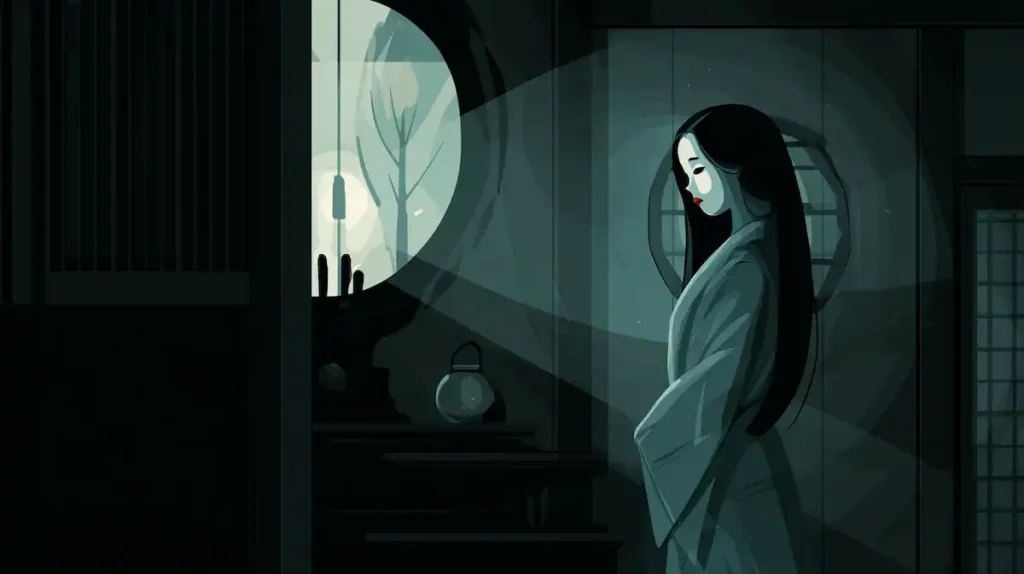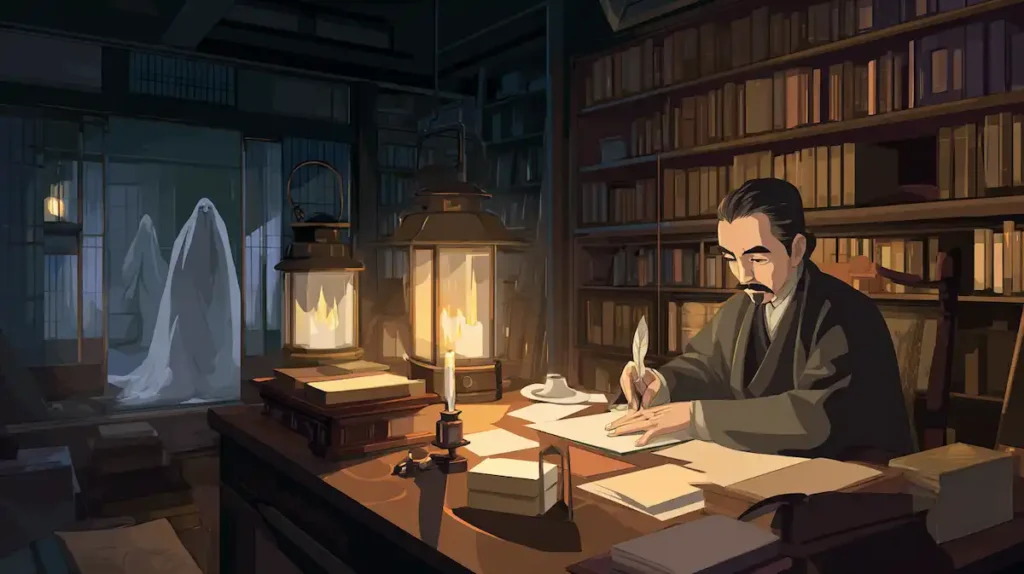怪談を英語で説明・紹介するための基本情報と、英会話に役立つ表現をシンプルでわかりやすい英語で紹介します。
英会話ダイアローグ・概要・10の質問を通して、怪談に関する英語表現を学びます。
英語
英会話ダイアローグを読む前に知っておくと良い前提知識と情報です。
- 怪談の基礎知識
- 日本の伝統的な怪異譚で、幽霊や妖怪、不思議な出来事を扱う物語
- 単なる恐怖話ではなく、人間の感情(愛、恨み、悲しみ)や道徳的教訓を含むのが特徴
- 西洋のホラーが驚かせることを重視するのに対し、怪談は静かな雰囲気と情緒を大切にする
- 歴史的背景
- 「百物語」は当時の娯楽で、夜に100本の蝋燭を灯し、怪談を1つ語るごとに1本ずつ消していくという集まり
- 100話目で本物の幽霊が現れるという言い伝えがある
- 江戸時代(1603-1868年)に怪談が大衆文化として花開いた
- 夏と怪談の関係
- 日本では夏に怪談を楽しむ伝統がある
- 怖い話で背筋が寒くなり、暑さを忘れられるという「涼」を取る
- 現代でも夏には怪談イベントやテレビ番組が多く放送される
- 代表的な作品
- 『四谷怪談』は最も有名な怪談の一つで、夫に裏切られた女性・お岩が幽霊となって復讐する話
- 『雪女』『耳なし芳一』なども古典的名作として知られてい類
- 小泉八雲(ラフカディオ・ハーン)
- ギリシャ生まれの作家で、1890年に日本に来た
- 日本の怪談を英語で世界に紹介した功労者
- 彼の著書『怪談』(Kwaidan)は日本文化を海外に伝える重要な作品となった
- 文化的な意味
- 怪談は生と死、現世と来世のつながりを表現する日本人の死生観を反映
- 恐怖だけでなく、美しさや哀れさも含む複雑な感情を描くことで、人間の本質を探求する文学ジャンル
2人が怪談について話しています。
怪談の起源や特徴、怖さだけでなく愛や悲しみといった感情や教訓を含む点、小泉八雲を通じて世界に広まったことなどを話題にしています。
会話 / dialogue

Hey Key, do you like ghost stories? I’ve been really into Japanese Kaidan lately.

Oh, Kaidan! You mean traditional Japanese ghost stories, right? What got you interested in them?

I watched a TV special about Kaidan last week. It was creepy but beautiful at the same time. I wanted to know more.

That’s interesting! Kaidan literally means “strange talk.” They’re stories about ghosts, spirits, and mysterious events.

So, they’re not just horror stories?

Not really. Many Kaidan include emotions like love, sadness, or regret. They often show the human heart, not just fear.

I see. So that’s what makes them different from Western horror, which focuses on shock or monsters.

Exactly. Japanese Kaidan are more about atmosphere and emotion. They can be quiet, mysterious, and even beautiful.

When did Kaidan start in Japan?

The idea goes back to ancient times, but they became very popular during the Edo period. People used to hold “Hyaku Monogatari,” where they told a hundred ghost stories by candlelight.

Wow, that sounds spooky! And I heard there’s a reason Kaidan are told in summer, right?

Yes! Because scary stories give people chills, which make them feel cooler in the hot season. It’s like a traditional summer entertainment.

That’s so Japanese—turning fear into something seasonal and fun.

True! And Kaidan often teach lessons, too. Many stories warn against greed, betrayal, or cruelty.

So they’re moral stories as well as ghost stories. That’s deep.

Yes, they reflect Japanese ideas about life and death, and the connection between the living and the dead.

Do you have a favorite Kaidan story?

I like Yotsuya Kaidan. It’s about a woman named Oiwa who becomes a ghost to take revenge on her unfaithful husband.

Oh, I’ve heard of that! It’s been performed in kabuki, right?

Exactly. And Lafcadio Hearn, or Koizumi Yakumo, also made Kaidan famous overseas. He translated stories like Mimi-nashi Hōichi and Yuki-onna.

Right, I remember reading about him. He was Greek-born, lived in America, and later became Japanese, didn’t he?

That’s right! He helped introduce Japanese ghost stories to the world in English.

I think that’s amazing—he showed that Kaidan are not just about fear, but also about human beauty and sorrow.

Exactly. That’s the charm of Kaidan. They mix fear, emotion, and beauty in a very Japanese way.

Now I really want to join a Kaidan event this summer. Maybe a “Kaidan night” or something like that!

Great idea! Listening to Kaidan under candlelight in summer—it’s the perfect way to experience traditional Japanese chills.
概要(日本の怪談とは?起源・特徴・魅力・現代の人気)
「怪談」について、理解を深めるための「英語での概要」です。
怪談

What Is Kaidan?
Kaidan means “strange talk” in Japanese. It refers to traditional ghost stories about spirits, ghosts, and mysterious events. These stories often come from old legends and folktales. They are not only scary but also emotional and meaningful. The word combines kai (strange) and dan (story or talk), showing that Kaidan are tales of the unknown.
History of Kaidan
The roots of Kaidan go back to ancient Japan, with stories written in old collections like Konjaku Monogatari. Kaidan became very popular during the Edo period (17th–19th century), when people enjoyed storytelling and kabuki theater. At that time, people held Hyaku Monogatari, or “One Hundred Stories,” where they told ghost stories by candlelight. After each story, they blew out one candle—believing a spirit might appear at the end.
Features and Meanings
Kaidan are not only about fear. Many of them include themes of love, regret, or revenge. They teach moral lessons, showing that bad actions bring bad results. Kaidan also express Japanese ideas about life and death, and the bond between the living and the dead.
Kaidan Today
Even today, Kaidan are very popular in Japan. They appear in TV shows, books, anime, and movies, especially in summer when people enjoy scary stories to feel cool. Famous examples include Yotsuya Kaidan, Banchō Sarayashiki, and Mimi-nashi Hōichi. Kaidan continue to show Japan’s love for mystery, emotion, and beauty hidden within fear.
10の質問(怪談の基本知識と魅力)
「怪談」について、理解を深めるための「英語での10の質問」です。
1: What does the word Kaidan mean?
Kaidan means “strange talk” in Japanese. It refers to ghost stories about spirits, ghosts, and mysterious events.
2: When did Kaidan become popular in Japan?
Kaidan became popular during the Edo period, when people enjoyed storytelling and kabuki plays.
3: What kind of stories are included in Kaidan?
Kaidan often tell stories of ghosts, love, regret, or revenge. They are not only scary but also emotional and meaningful.
4: Why were Kaidan often told in summer?
Because people believed that scary stories made them feel cool in the hot summer, so Kaidan became a summer tradition.
5: What is “Hyaku Monogatari”?
It was a game where people told one hundred ghost stories by candlelight, blowing out one candle after each story.
6: Who is Lafcadio Hearn (Koizumi Yakumo)?
He was a Greek-born writer who lived in Japan and introduced Japanese ghost stories to the world in English.
7: What are some famous Kaidan stories?
Famous Kaidan include Yotsuya Kaidan, Banchō Sarayashiki, Mimi-nashi Hōichi, and Yuki-onna.
8: What lessons do Kaidan teach?
Kaidan often teach moral lessons, showing that bad actions bring bad results and good actions are rewarded.
9: How are Kaidan different from Western horror stories?
Kaidan focus more on emotions and atmosphere, while Western horror often focuses on shock and violence.
10: Are Kaidan still popular today?
Yes, they are still popular in Japan through TV shows, books, anime, movies, and summer events.

和訳付
会話 / dialogue

Hey Key, do you like ghost stories? I’ve been really into Japanese Kaidan lately.
ねえキー、幽霊の話って好き? 最近、日本の怪談にハマってるんだ。

Oh, Kaidan! You mean traditional Japanese ghost stories, right? What got you interested in them?
ああ、怪談ね! 日本の伝統的な幽霊話のことでしょ? どうして興味を持ったの?

I watched a TV special about Kaidan last week. It was creepy but beautiful at the same time. I wanted to know more.
先週、怪談の特集番組を観たんだ。怖いんだけど、どこか美しくてさ。もっと知りたくなったんだよ。

That’s interesting! Kaidan literally means “strange talk.” They’re stories about ghosts, spirits, and mysterious events.
面白いね! 「怪談」って文字通り「奇妙な話」っていう意味なんだ。幽霊や霊、不思議な出来事を題材にした物語なんだよ。

So, they’re not just horror stories?
じゃあ、ただのホラーとは違うんだね?

Not really. Many Kaidan include emotions like love, sadness, or regret. They often show the human heart, not just fear.
そうだね。怪談には愛や哀しみ、未練みたいな感情も描かれているんだ。恐怖だけじゃなく、人の心を映しているんだよ。

I see. So that’s what makes them different from Western horror, which focuses on shock or monsters.
なるほど。西洋のホラーがショックとかモンスター中心なのと違うわけだね。

Exactly. Japanese Kaidan are more about atmosphere and emotion. They can be quiet, mysterious, and even beautiful.
その通り。日本の怪談は雰囲気や感情を大事にするんだ。静かで神秘的で、時には美しさすらあるんだよ。

When did Kaidan start in Japan?
日本で怪談っていつ頃から始まったの?

The idea goes back to ancient times, but they became very popular during the Edo period. People used to hold “Hyaku Monogatari,” where they told a hundred ghost stories by candlelight.
起源は古代にさかのぼるけど、江戸時代にすごく流行ったんだよ。「百物語」っていうろうそくを灯して百話の怪談を語る会があったんだ。

Wow, that sounds spooky! And I heard there’s a reason Kaidan are told in summer, right?
うわ、それは怖そうだね! そういえば、怪談って夏に語られる理由があるんでしょ?

Yes! Because scary stories give people chills, which make them feel cooler in the hot season. It’s like a traditional summer entertainment.
そうそう! 怖い話を聞くとゾクッとして涼しく感じるからなんだ。日本の夏の風物詩みたいなものだよ。

That’s so Japanese—turning fear into something seasonal and fun.
いかにも日本的だね。怖さを季節の楽しみに変えちゃうなんて。

True! And Kaidan often teach lessons, too. Many stories warn against greed, betrayal, or cruelty.
ほんとだね! しかも怪談には教訓もあるんだ。欲や裏切り、残酷さへの警告みたいな意味もあるんだよ。

So they’re moral stories as well as ghost stories. That’s deep.
なるほど、幽霊話でありながら道徳的な物語でもあるんだね。深いなあ。

Yes, they reflect Japanese ideas about life and death, and the connection between the living and the dead.
うん。怪談は日本人の「生と死」や「生者と死者のつながり」に対する考え方を表してるんだ。

Do you have a favorite Kaidan story?
キーはお気に入りの怪談ってある?

I like Yotsuya Kaidan. It’s about a woman named Oiwa who becomes a ghost to take revenge on her unfaithful husband.
『四谷怪談』が好きだな。裏切られた妻・お岩が幽霊になって夫に復讐する話なんだ。

Oh, I’ve heard of that! It’s been performed in kabuki, right?
あっ、それ聞いたことある! 歌舞伎でも演じられてるやつだよね?

Exactly. And Lafcadio Hearn, or Koizumi Yakumo, also made Kaidan famous overseas. He translated stories like Mimi-nashi Hōichi and Yuki-onna.
そうそう。それにラフカディオ・ハーン、つまり小泉八雲も海外に怪談を広めたんだ。『耳なし芳一』や『雪女』なんかを英語で紹介したんだよ。

Right, I remember reading about him. He was Greek-born, lived in America, and later became Japanese, didn’t he?
ああ、聞いたことある! ギリシャ生まれで、アメリカに住んでて、後で日本人になったんだよね?

That’s right! He helped introduce Japanese ghost stories to the world in English.
その通り! 彼のおかげで、日本の怪談が世界に知られるようになったんだ。

I think that’s amazing—he showed that Kaidan are not just about fear, but also about human beauty and sorrow.
すごいよね。怪談って、恐怖だけじゃなくて、人間の美しさとか哀しさも描いてるって伝えたんだもんね。

Exactly. That’s the charm of Kaidan. They mix fear, emotion, and beauty in a very Japanese way.
そう、それが怪談の魅力なんだ。恐怖と感情、美しさが日本的な形で融合してるんだよ。

Now I really want to join a Kaidan event this summer. Maybe a “Kaidan night” or something like that!
なんかこの夏、怪談イベントに行ってみたくなったな。「怪談ナイト」みたいなの、探してみようかな!

Great idea! Listening to Kaidan under candlelight in summer—it’s the perfect way to experience traditional Japanese chills.
いいね! 夏の夜にろうそくの灯りの下で怪談を聞くなんて、日本らしい“ゾクッとする”体験だよ!
概要(日本の怪談とは?起源・特徴・魅力・現代の人気)
怪談

What Is Kaidan?
Kaidan means “strange talk” in Japanese. It refers to traditional ghost stories about spirits, ghosts, and mysterious events. These stories often come from old legends and folktales. They are not only scary but also emotional and meaningful. The word combines kai (strange) and dan (story or talk), showing that Kaidan are tales of the unknown.
「怪談(Kaidan)」とは、日本語で「奇妙な話」という意味です。幽霊や霊、不思議な出来事を題材にした日本の伝統的な物語を指します。これらの話の多くは古い伝説や民話に由来しています。単に怖いだけでなく、感情的で深い意味を持つものも多いです。「怪(あやしい)」と「談(はなし)」が合わさり、「未知の世界を語る物語」という意味を表しています。
History of Kaidan
The roots of Kaidan go back to ancient Japan, with stories written in old collections like Konjaku Monogatari. Kaidan became very popular during the Edo period (17th–19th century), when people enjoyed storytelling and kabuki theater. At that time, people held Hyaku Monogatari, or “One Hundred Stories,” where they told ghost stories by candlelight. After each story, they blew out one candle—believing a spirit might appear at the end.
怪談の起源は古代日本にさかのぼり、『今昔物語集』などの古い物語集にもその原型が見られます。怪談が特に流行したのは江戸時代(17〜19世紀)で、人々は語り物や歌舞伎を通して怪談を楽しみました。当時は「百物語(ひゃくものがたり)」という会があり、ろうそくを灯して怪談を語り、一話ごとに一本ずつ消していきました。最後の話を語り終えると、本当に幽霊が現れると信じられていました。
Features and Meanings
Kaidan are not only about fear. Many of them include themes of love, regret, or revenge. They teach moral lessons, showing that bad actions bring bad results. Kaidan also express Japanese ideas about life and death, and the bond between the living and the dead.
怪談は恐怖だけを描いたものではありません。多くの物語には、愛や後悔、復讐といったテーマが含まれています。悪い行いは悪い結果をもたらすという道徳的な教訓を伝えるものもあります。また、怪談は日本人の「生と死」に対する考え方や、「生者と死者のつながり」を表現しています。
Kaidan Today
Even today, Kaidan are very popular in Japan. They appear in TV shows, books, anime, and movies, especially in summer when people enjoy scary stories to feel cool. Famous examples include Yotsuya Kaidan, Banchō Sarayashiki, and Mimi-nashi Hōichi. Kaidan continue to show Japan’s love for mystery, emotion, and beauty hidden within fear.
現代でも、怪談は日本で非常に人気があります。テレビ番組や本、アニメ、映画などに登場し、特に夏には「涼」を感じるために怖い話を楽しむ風習があります。有名な作品には『四谷怪談』『番町皿屋敷』『耳なし芳一』などがあります。怪談は今もなお、「恐怖の中に潜む美しさや感情、神秘」を愛する日本人の心を映し出しています。
10の質問(怪談の基本知識と魅力)
1: What does the word Kaidan mean?
「怪談」という言葉は何を意味しますか?
Kaidan means “strange talk” in Japanese. It refers to ghost stories about spirits, ghosts, and mysterious events.
怪談は日本語で「奇妙な話」という意味です。霊や幽霊、不思議な出来事を題材にした物語を指します。
2: When did Kaidan become popular in Japan?
怪談はいつ日本で人気になったのですか?
Kaidan became popular during the Edo period, when people enjoyed storytelling and kabuki plays.
怪談は、語り物や歌舞伎が盛んだった江戸時代に人気になりました。
3: What kind of stories are included in Kaidan?
怪談にはどのような話が含まれていますか?
Kaidan often tell stories of ghosts, love, regret, or revenge. They are not only scary but also emotional and meaningful.
怪談には、幽霊や愛、後悔、復讐などの物語が多くあります。怖いだけでなく、感情的で深い意味を持っています。
4: Why were Kaidan often told in summer?
なぜ怪談は夏によく語られたのですか?
Because people believed that scary stories made them feel cool in the hot summer, so Kaidan became a summer tradition.
暑い夏に怖い話を聞くと涼しく感じると信じられていたため、怪談は夏の風物詩となりました。
5: What is “Hyaku Monogatari”?
「百物語」とは何ですか?
It was a game where people told one hundred ghost stories by candlelight, blowing out one candle after each story.
ろうそくの灯りの下で百話の怪談を語り、一話ごとに一本ずつろうそくを消していく遊びでした。
6: Who is Lafcadio Hearn (Koizumi Yakumo)?
ラフカディオ・ハーン(小泉八雲)とは誰ですか?
He was a Greek-born writer who lived in Japan and introduced Japanese ghost stories to the world in English.
彼はギリシャ生まれの作家で、日本に住み、日本の怪談を英語で世界に紹介した人物です。
7: What are some famous Kaidan stories?
有名な怪談にはどんなものがありますか?
Famous Kaidan include Yotsuya Kaidan, Banchō Sarayashiki, Mimi-nashi Hōichi, and Yuki-onna.
有名な怪談には、『四谷怪談』、『番町皿屋敷』、『耳なし芳一』、『雪女』などがあります。
8: What lessons do Kaidan teach?
怪談はどんな教訓を伝えていますか?
Kaidan often teach moral lessons, showing that bad actions bring bad results and good actions are rewarded.
怪談は、「悪い行いは悪い結果を招き、良い行いは報われる」という道徳的な教訓を伝えています。
9: How are Kaidan different from Western horror stories?
怪談は西洋のホラーとどう違いますか?
Kaidan focus more on emotions and atmosphere, while Western horror often focuses on shock and violence.
怪談は感情や雰囲気を重視しますが、西洋のホラーは衝撃や暴力を中心に描かれることが多いです。
10: Are Kaidan still popular today?
怪談は今でも人気がありますか?
Yes, they are still popular in Japan through TV shows, books, anime, movies, and summer events.
はい。怪談は今でもテレビ番組、本、アニメ、映画、そして夏のイベントなどで日本中に人気があります。

words & phrases
英会話ダイアローグと関連情報に出てきた単語・フレーズです(例文は各3つ)。

spooky : 形容詞 /ˈspuː.ki/
意味: 不気味な、ゾッとする。Strangely scary or mysterious, often in a fun or exciting way.
(怪談の雰囲気や、ろうそくの明かりの中で語られる怖い話を形容)
例文:
- The old temple looked spooky at night.
「その古い寺は夜になると不気味に見えました。」 - We told some spooky stories during the summer night.
「私たちは夏の夜にいくつかの怖い話をしました。」 - The wind made a spooky sound through the trees.
「風が木々の間を通り抜けて不気味な音を立てました。」
greed : 名詞 /ɡriːd/
意味: 強欲、欲張り。A strong desire for more money, power, or possessions.
(怪談で人の強欲が悪い結果を招く教訓として描かれる)
例文:
- His greed led him to betray his friend.
「彼の強欲が友人を裏切る原因になりました。」 - Many Kaidan warn people against greed.
「多くの怪談は人々に強欲を戒める教訓を伝えています。」 - Greed can destroy a person’s happiness.
「強欲は人の幸せを壊すことがあります。」
betrayal : 名詞 /bɪˈtreɪ.əl/
意味: 裏切り。An act of being disloyal or breaking trust.
(『四谷怪談』などで、裏切られた女性の復讐が物語の中心)
例文:
- Oiwa’s story in Yotsuya Kaidan is about betrayal and revenge.
「『四谷怪談』のお岩の物語は裏切りと復讐を描いています。」 - The ghost appeared because of a deep betrayal.
「深い裏切りが原因で幽霊が現れました。」 - Betrayal can turn love into anger.
「裏切りは愛を怒りに変えてしまうことがあります。」
cruelty : 名詞 /ˈkruː.əl.ti/
意味: 残酷さ。Behavior that causes pain or suffering to others.
(怪談では、他人への残酷さが呪いや報いを呼ぶ要因として登場)
例文:
- The story teaches that cruelty will be punished.
「その物語は、残酷さは罰せられるという教訓を伝えています。」 - Her ghost returned to take revenge for the cruelty she suffered.
「彼女の幽霊は、受けた残酷さへの復讐のために戻ってきました。」 - Cruelty to others brings bad karma in many Kaidan.
「多くの怪談では、他人への残酷さが悪い因果を招くとされています。」
unfaithful : 形容詞 /ʌnˈfeɪθ.fəl/
意味: 浮気な、不誠実な。Not loyal or true to a partner or promise.
(『四谷怪談』の夫のように、不誠実な行いが悲劇や呪いを招く)
例文:
- Oiwa’s husband was unfaithful, and she became a ghost to take revenge.
「お岩の夫は不誠実で、彼女は復讐のために幽霊になりました。」 - Being unfaithful can lead to guilt and regret.
「不誠実な行動は罪悪感や後悔を招くことがあります。」 - The story warns people not to be unfaithful in love.
「その物語は、人に対して愛に不誠実であってはならないと警告しています。」
